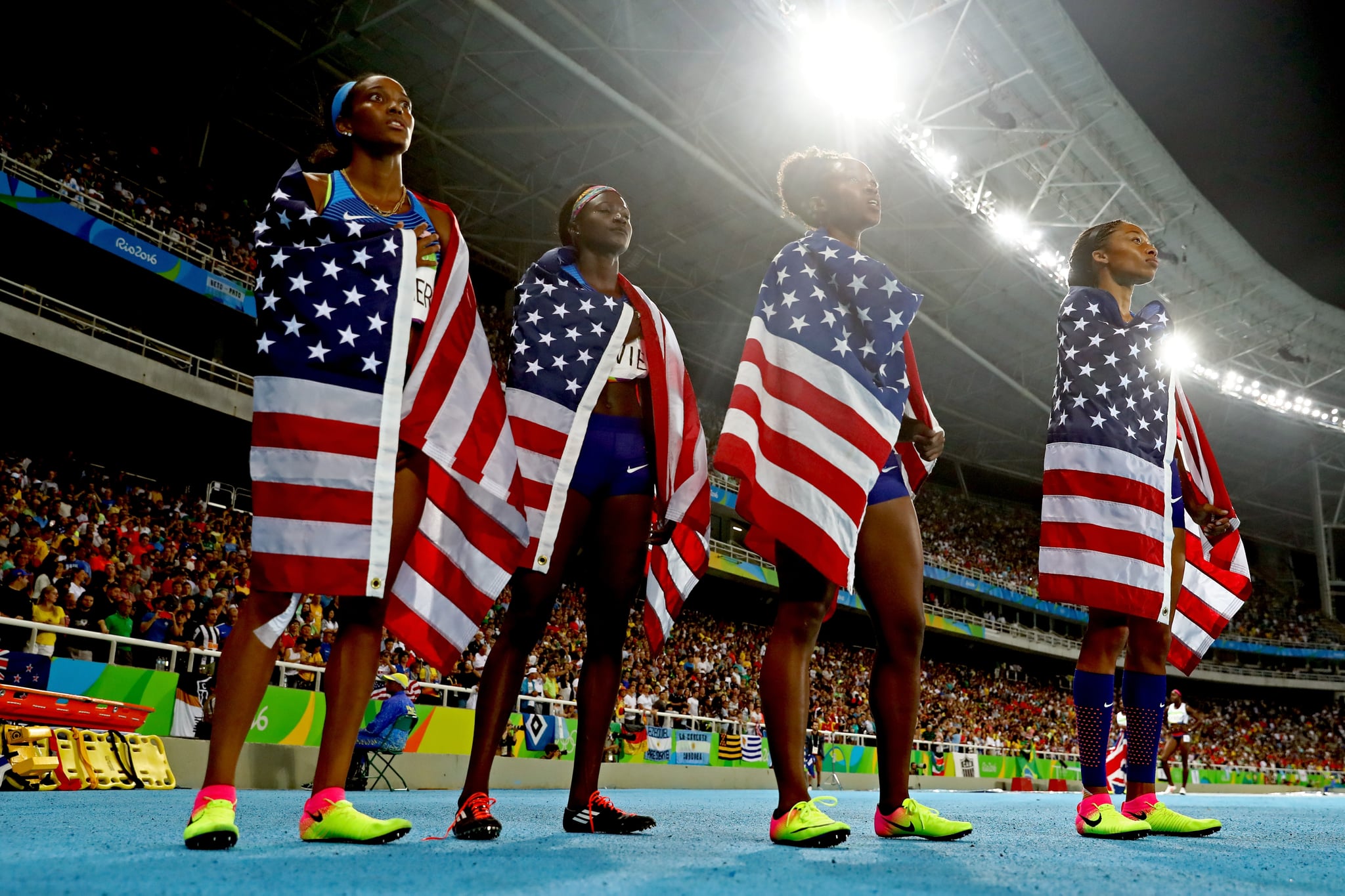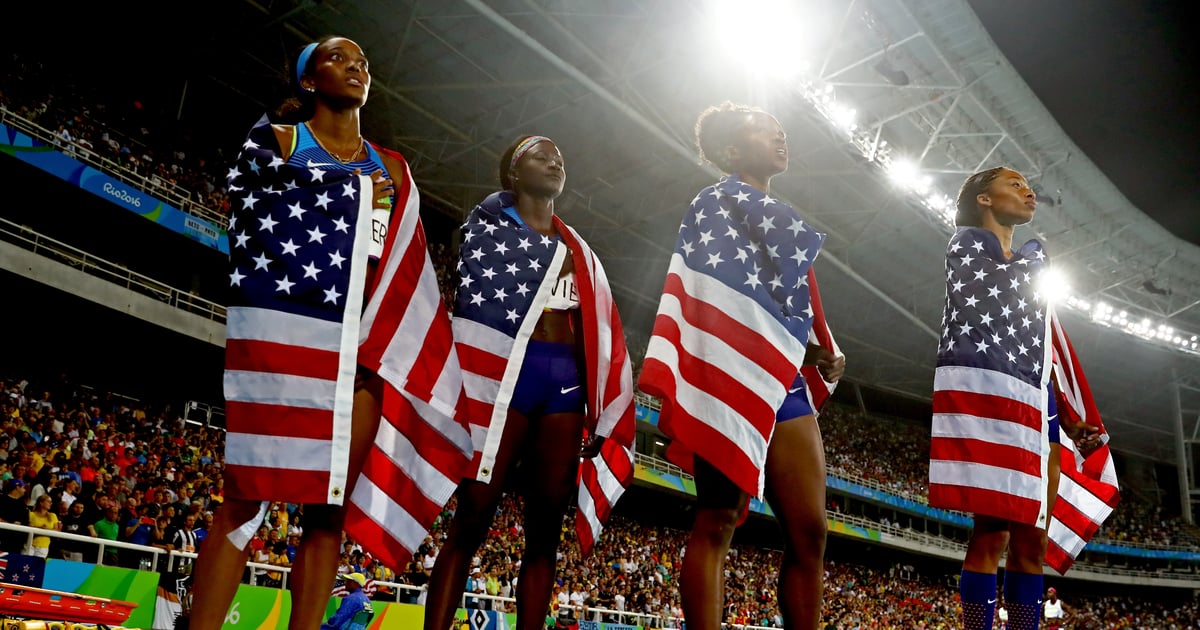Products You May Like

On April 23, Olympic sprinter Tori Bowie died at age 32, eight months pregnant. An autopsy report released on June 13 revealed that she died from complications related to childbirth, including respiratory distress and preeclampsia — a high blood pressure condition that develops during the end of pregnancy and can cause seizures.
The report, like the initial news of Bowie’s tragic passing, has made headlines around the world, in large part because the results highlight yet again the disproportionately high maternal mortality rate among Black people.
On June 14, one of Bowie’s teammates from the 2016 Olympic Games in Rio de Janeiro, Tianna (Bartoletta) Madison, addressed Bowie’s autopsy results, and further spotlighted the Black maternal health crisis, in a powerful Instagram post.
One highlight of Bowie’s career was running the anchor leg of the 4×100-meter relay at the 2016 Olympic Games, earning a gold medal for the US alongside teammates Madison, Allyson Felix, and English Gardner.
But in her caption, Madison revealed that something else unites the team: that like Bowie, both she and Felix suffered life-threatening complications during childbirth.
“THREE (3) of the FOUR (4) of us who ran on the SECOND fastest 4x100m relay of all time, the 2016 Olympic Champions have nearly died or died in childbirth.”
“THREE (3) of the FOUR (4) of us who ran on the SECOND fastest 4x100m relay of all time, the 2016 Olympic Champions have nearly died or died in childbirth,” Madison wrote. “WTF. Why? Black women have the HIGHEST maternal mortality rate. 3 times higher than white women. And the more educated the black woman, the higher her mortality rate becomes.”
This stat is, horrifically, true — despite the fact that 80 percent of pregnancy-related deaths are preventable, according to the Centers for Disease Control and Prevention (CDC).
Madison went on to share her story about what happened when she gave birth to her son, Kai, in November 2021. “In fact, even though I went into labor at 26 weeks we went to the hospital with my medical advance directive AND my will. Additionally I had a VERY tough conversation with @cwryaniii [Kai’s father] about who to save if it came down to it. I was NOT AT ALL confident that I’d be coming home,” she wrote.
“There are two reasons why I did make it,” Madison continued. “1) knowledge- I was all to aware of@the disparity and communicated this to my partner so we could go in eyes wide open 2) since I was busy dying. Chuck had to advocate for me and he did. Even though we agreed about who his priority would be in an emergency situation he did not take no for an answer from the doctors and as a result saved me AND the baby.”
In 2018, Felix also developed preeclampsia and had to undergo an emergency C-section to give birth to her daughter, Camryn. She’s since become a fierce activist around the Black maternal health crisis and healthcare disparities in America.
Felix commented on Madison’s Instagram post, writing: “It’s heartbreaking. We continue to face a maternity mortality crisis in this country. Black women are at risk. It’s why I won’t stop doing this work. We can’t sit by and continue to watch our loved ones die when many of these complications are preventable.”
On June 15, Felix posted an Instagram of her own, elaborating on her comment on Madison’s post. “These are my teammates,” Felix wrote in the caption for the carousel, which featured an image of the 2016 Olympic Games relay team. “We are Olympic champions. Three of us tried to give birth. Two of us experienced near-death complications. One of us died. We have to, and we will do more. Tori’s death cannot and will not be in vain.”
In Madison’s caption, she blamed “J. Marion Sims and of course racism that became systemic and embedded in the healthcare system,” for the Black maternal health crisis. Sims was a physician in the 1840s who’s often lauded as the “father of modern gynecology,” but unethically used enslaved Black bodies as medical test subjects.
Sims’ actions are a shocking demonstration of our medical system’s disturbing and racist past, and the effects persist more than a century and a half later. In fact, the Black maternal care gap continues to widen. An October 2022 analysis found that the COVID pandemic increased maternal mortality rates disproportionately among Hispanic and Black women, worsening the racial disparities that exist in US healthcare.
Racial bias is rampant in healthcare settings, and it leaves patients feeling unheard, dismissed, mistreated, or worse — with their lives at risk. And when it comes to pregnancy and childbirth, this affects Black mothers more than anyone else.
Madison’s and Felix’s posts — and the fact that three out of four of these Olympians died or nearly died bringing babies into this world — is a harrowing symbol of exactly how many Black mothers’ lives are at risk in the current medical climate.
In the comments section of Madison’s post, other athletes and mothers shared their frustrations and sympathies, grieving this as an “all-too-personal loss,” and asking the question that’s top of mind: How many more times will this same story need to be told before we see a change?
